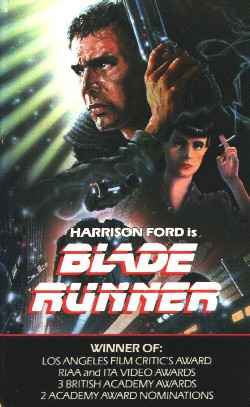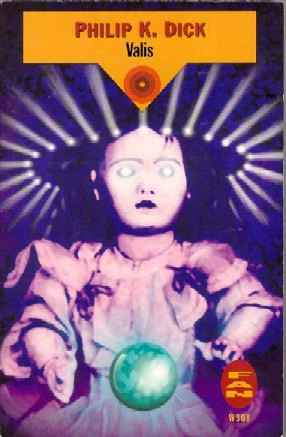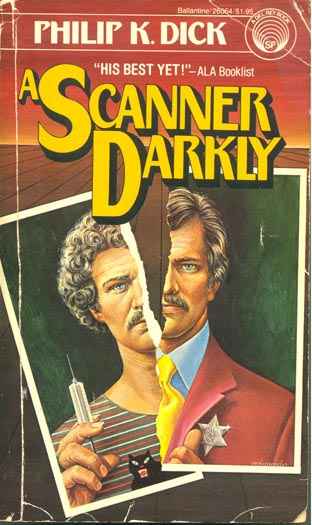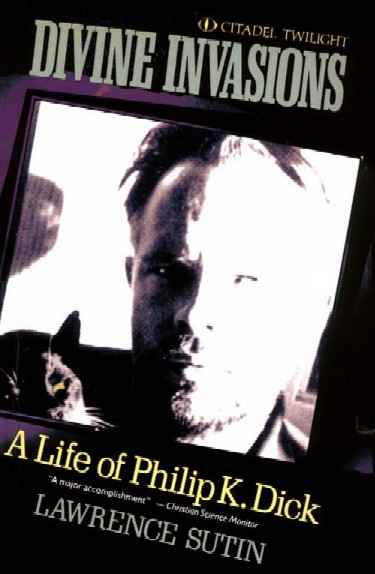|
Philip K. Dick Philip K. Dick wrote the stories on which some of America's most memorable movies were based, but his important work is far more bizarre and challenging than anything Hollywood would ever consider putting on a screen.
Philip K. Dick wrote the stories on which some of America's most memorable movies were based, but his important work is far more bizarre and challenging than anything Hollywood would ever consider putting on a screen. Dick was born in Chicago in 1928, along with a twin sister who died just a few days later. Like Elvis, this catastrophic loss of a twin would haunt Dick for the rest of his days, poisoning his relationships with women, but at the same time driving him to prolific heights as an artist. Dick wrote dozens of science fiction novels during his career and hundreds of short stories, in addition to several works that were at most only marginally sci-fi. Many of Dick's works were remarkably pulpy, filled with rockets and mordant humor, representative of a genre style that today often seems antiquated. After 1974, however, his work took a sharp left turn and transformed into something different (but still consistent with what had went before). The change was prompted by Dick's personal encounter with God, which changed both his life and his literature permanently. After studying philosophy at Berkeley, Dick began writing relentlessly, with a string of short stories debuting in sci-fi pulp magazines in the early 1950s, and his first novel debuting in 1954. His works were characterized by paranoid ramblings and speculations about alternative histories and the triumph of fascism in America. His stories frequently delved into heavy philosophical questions about the nature of reality and the meaning of individual identity, often resulting in trippy mind-bending zen-koan-style novels that leave some readers puzzled, others enlightened and still more deeply disturbed. In 1956, Dick wrote a dark vision of a future fascist America run by a police force that used psychics to predict crimes (and arrest criminals) before they could happen. The short story, called "The Minority Report," mirrored many of Dick's favorite themes, including explorations of police states and the nature of time and free will. The fascist themes were taken to perhaps to their ultimate height in "The Man in the High Castle," a 1962 novel set in an alternate America, which had been conquered by the Axis nations in World War II. "Castle" was a sweeping literary triumph that won a Hugo award for the author. In addition to his endless fascination with the police state and fascism, Dick also looked deeply (and sometimes very uncomfortably) into the role of race in the fascist mindset, making savagely pointed observations with a striking disregard for political correctness.
As in "Castle," Dick's stories frequently visited alternate histories, parallel worlds in which events took a different turn than in our own, and his books frequently presented them as such complete with the implication that our own world is part of the story, a conceit that has been endlessly imitated in the genre. Dick also wrote at great length about Drugs and Mind Control, both recreational and conspiratorial. In most of his works, drugs are depicted as methods for manipulation and control, employed against hapless users in search of a good time. The theme was repeated in many of his works, most tragically in "A Scanner Darkly," a story about a drug addict whose identity is fractured by his abuse until he develops a split personality: as Bob Arctor, he is a drug user. As "Fred," he is a nark, reporting on Arctor's activities to the federal government. In the end, even Fred becomes a victim of drugs and the system's machinations. The book is dedicated to a list of Dick's friends whose health and sometimes lives had been destroyed by drugs including Dick himself. Dick's fertile mind produced tale after tale. His ideas were so strong (and often bizarre) that they were adapted into movies, among them "Minority Report," "Blade Runner," "Screamers" and "Total Recall." But his writing took a quantum leap into the Twilight Zone in 1974, when Dick began receiving messages from the entity formerly known as God.
When she left, the weirdness started. Dick began having visions, which continued for several weeks. He experienced a pink laser-like beam entering his mind and he began to have visions. The visions had a number of components. In addition to a series of geometric images which he compared to abstract art, he repeatedly saw images of ancient Rome around the time of Christ. Dick believed in the absolute reality of the experience, despite the drugs in his system, the severe duress caused by pain and his past history of drug use (drugs are an extremely frequent theme in his work). He felt he was being contacted by a superior intelligence. Over the course of years, he would refer to this intelligence in different ways, as "Zebra" or God, but the name that really stuck was VALIS an acronymn for Vast Active Living Intelligence System. Dick's belief in the reality of the experience was based on several specific happenings. At one point, he began speaking in ancient Greek (a language he had never studied). His wife took phonetic notes of the sounds he made, of which they uncovered the meaning later.
The experience permanently changed Dick, and dramatically shaped his remaining years on earth. Despite the seeming proofs mentioned above, Dick was plagued with doubts about his own sanity and the reality of VALIS, but it became obsessive material for him. He spent virtually every night of the rest of his life writing about the experience in an 8,000 page journal now called the "Exegis." The entries range from inspired to confused to forlorn. The VALIS vision also sent Dick into occasional spirals of deep paranoia, in which he constructed dark scenarios about the FBI and the KGB monitoring his communications and laying elaborate traps for him. At one point, he believed his house had been broken into and his papers searched by intelligence agents. In later writings, he hinted that he may have committed the break-in himself, only to forget it later. VALIS also became a recurring element in Dick's writing, and several of his subsequent novels included some or all of the experience in various forms. 2-3-74 most significantly resulted in the VALIS trilogy, which Dick considered a pinnacle of his work. The first novel in the series, "VALIS," is a mind-bendingly autobiographical work of fiction which delves into the 2-3-74 visions in great detail. Horselover Fat is a main character in the novel, and the book's narrator is Philip K. Dick, who is also Horselover Fat. The second novel, "The Divine Invasion," is a pulpy sci-fi rewriting of various Gnostic Christian myths, while the third book, "The Transmigration of Timothy Archer," is almost entirely a mainstream novel with little of the fantastic (but dealing in great detail with Gnostic cosmologies and existing within the same continuity as the first book).
Dick's visions outlined a view of reality not dissimilar from the fictional worlds he had already crafted. Although the particulars shifted as he tried to assimilate the experience, Dick basically believed in a world view similar to that of the Gnostic Christians. The Gnostics were an early Christian sect that believed divine revelation to individuals represented the only valid way to experience spirituality (an anti-hierarchical stance that resulted in their extermination as heretics by the Church of Rome). The Gnostics more or less believed that reality is a prison made of matter, created by an evil God, which the enlightened seek to ascend from. From Dick, these concepts spread to infiltrate pop culture on a number of levels, notably including "The Matrix" movies and Grant Morrison's comic book The Invisibles, which is obviously and heavily influenced by Dick's work. Dick believed VALIS might have been a satellite in space, which beams enlightenment to people on earth, who are primed for this experience by their exposure to what Dick called "disinhibiting stimuli," symbols and concepts designed to unlock perceptions (such as the pisces symbol). Dick also believed that history had been subverted and actually stopped in the first century A.D., when the Gnostics were forced underground by the Roman Empire, which symbolized the forces of materialism. In Dick's view, "the Empire never ended," a phrase repeated mantra-like throughout the Exegis. He speculated that he and others had been awakened by VALIS at a critical juncture in history, with the purpose of removing Richard M. Nixon from office. After wrestling with the problems presented by experiencing the divine for nearly 10 years, Dick finally succumbed to a stroke in 1982. After 8,000 pages of Exegis, it was clear that in many ways he felt no closer to the mysteries of 2-3-74 than the day the visions started. Perhaps the answers were waiting for him on the other side.
|
 In "Flow My Tears the Policeman Said," a 1974 novel about drugs that literally bend reality, genetically engineered supermen are rendered helpless by the banality of a fascist police bureaucracy. In this alternate world, an act of Congress decades earlier restricted the reproduction of blacks so severely that they are treated as an "endangered species" in the novel's time frame.
In "Flow My Tears the Policeman Said," a 1974 novel about drugs that literally bend reality, genetically engineered supermen are rendered helpless by the banality of a fascist police bureaucracy. In this alternate world, an act of Congress decades earlier restricted the reproduction of blacks so severely that they are treated as an "endangered species" in the novel's time frame.  On February 2, 1974 (which Dick would write of as 2-3-74 for the rest of his life), Dick was recovering from an impacted wisdom tooth and under the receding effects of sodium pentathol. A delivery woman arrived with more painkillers. She was wearing a pendant featuring a golden "vesica pisces," the intersecting arcs in the shape of a fish commonly associated with early Christians.
On February 2, 1974 (which Dick would write of as 2-3-74 for the rest of his life), Dick was recovering from an impacted wisdom tooth and under the receding effects of sodium pentathol. A delivery woman arrived with more painkillers. She was wearing a pendant featuring a golden "vesica pisces," the intersecting arcs in the shape of a fish commonly associated with early Christians.  In another of the VALIS visions, Dick was made to understand that his infant son was gravely ill, although he showed no symptoms. When they took him to the doctor and insisted on an examination, the doctor discovered a lethal inguinal hernia which required immediate surgery. His son was treated and recovered, which Dick credited to VALIS.
In another of the VALIS visions, Dick was made to understand that his infant son was gravely ill, although he showed no symptoms. When they took him to the doctor and insisted on an examination, the doctor discovered a lethal inguinal hernia which required immediate surgery. His son was treated and recovered, which Dick credited to VALIS. Elements of 2-3-74 also dominate Dick's novels "A Scanner Darkly" and "Radio Free Albemuth." The latter book again featured a fictional Philip K. Dick as the protagonist.
Elements of 2-3-74 also dominate Dick's novels "A Scanner Darkly" and "Radio Free Albemuth." The latter book again featured a fictional Philip K. Dick as the protagonist.